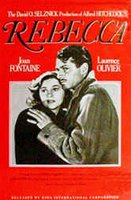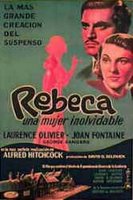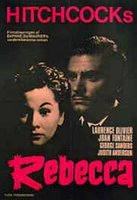Director: Alfred Hitchcock
Written by: Daphne Du Maurier (novel) and Philip MacDonald (adaptation)
Cast: Laurence Olivier as George Fortescu Maximillian 'Maxim' de Winter; Joan Fontaine as The Second Mrs. de Winter; George Sanders as Jack Favell; Judith Anderson Mrs
Year: 1940
Runtime: 130 min
Country: USA
Language: English
Colour: Black and White
Runtime: 130 min
Country: USA
Language: English
Colour: Black and White
Rebecca is an engaging romanc
The most captivating aspect of this story is that, although the house is impressed with Rebecca’s personal possessions as if she is still alive, no pictures or photos of her are shown in the mansion. Yet, from the servants' descriptions and accounts, by looking at her clothes and personal items, it is easy and rather intriguing to picture Rebecca as a demonic femme fatale. Her depiction clearly reminds me of Carmilla's. Another parallel to this latter is the morbid attitude the devilish governess shows towards the dead woman, which recalls again very much the lesbian attitude Carmilla has towards her victims. And the sinister figure of the housekeeper respects all the typical literary canons, with an astonishing accomplishment.
The following two passages, respectively from Carmilla and from Rebecca, echo each others notably:
Laura: "... to this hour the image of Carmilla returns to memory with ambiguous alternations--sometimes the playful, languid, beautiful girl; sometimes the writhing fiend I saw in the ruined church; and often from a reverie I have started, fancying I heard the light step of Carmilla at the drawing-room door."
Mrs Danvers: "You wouldn't think she'd been gone so long, would you? Sometimes, when I walk along the corridor, I fancy I hear her just behind me. That quick light step, I couldn't mistake it anywhere. It's not only in this room, it's in all the rooms in the house. I can almost hear it now."
But unlike Carmilla, Rebecca's nature remains human.
"Mrs Danvers: Do you think the dead come back and watch the living?
The Second Mrs. de Winter: N-no, I don't believe it."
This technique of ambiguously mingling real with metaphisical terror stimulates an active imagination in the audience, and chilling emotions are certainly ensured. On the other hand, the denouement is always quick, rather painless and always relieving—a reassuring facet for those who are not thriller aficionados but adamant of sophisticated thrilling classics.
The Second Mrs. de Winter: N-no, I don't believe it."
This technique of ambiguously mingling real with metaphisical terror stimulates an active imagination in the audience, and chilling emotions are certainly ensured. On the other hand, the denouement is always quick, rather painless and always relieving—a reassuring facet for those who are not thriller aficionados but adamant of sophisticated thrilling classics.
* This is the third Hotchcock film I have enjoyed, the first being Rear Window (1954) and the second Notorious (1946). And no, I haven't watched Psycho as yet, but it is in my waiting list and I have already seen all the clips at the Saul Bass exhibition last year.





No comments:
Post a Comment